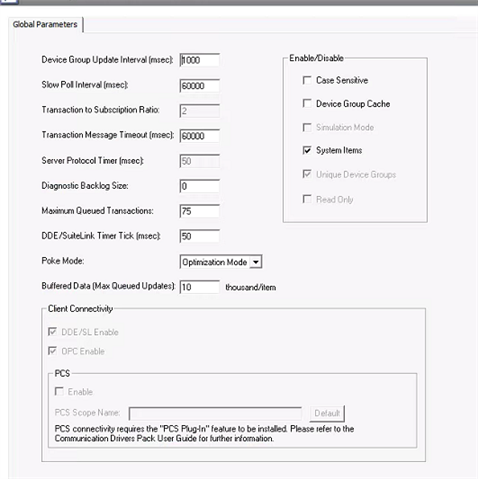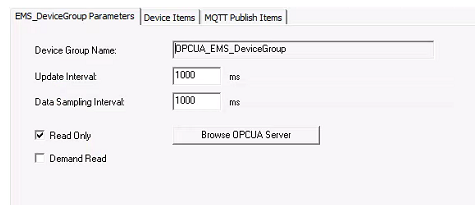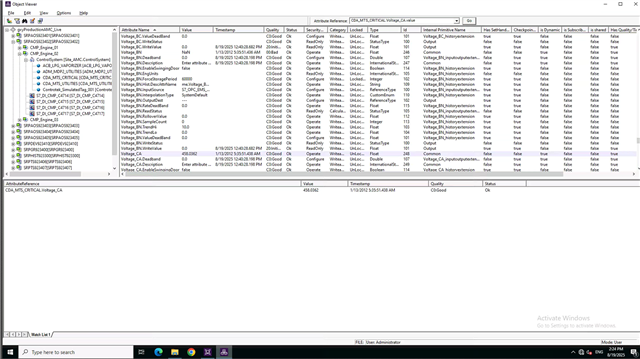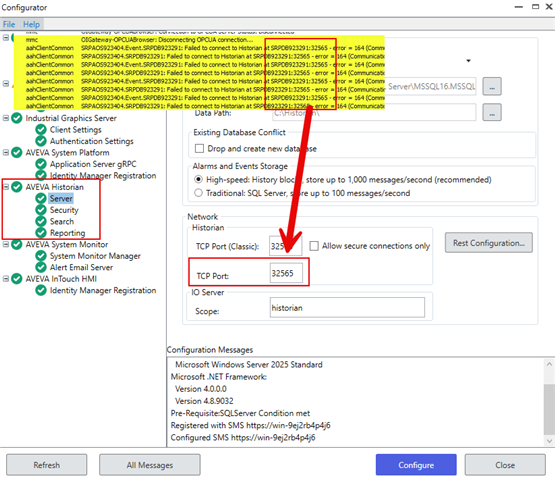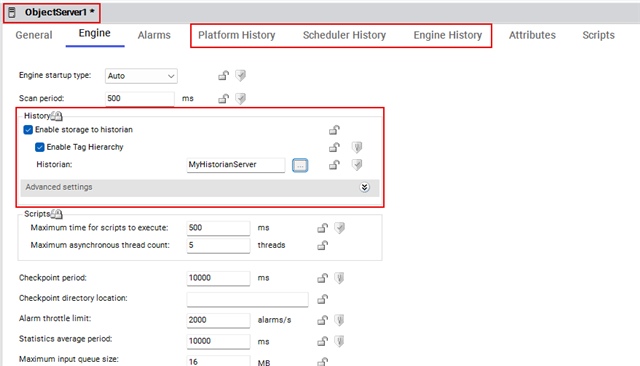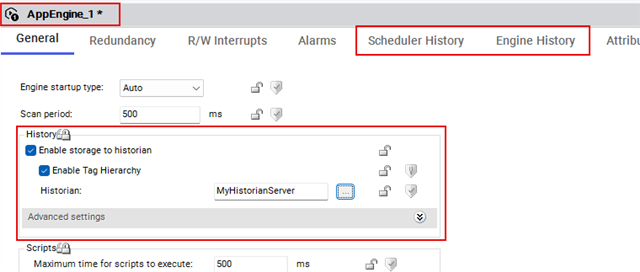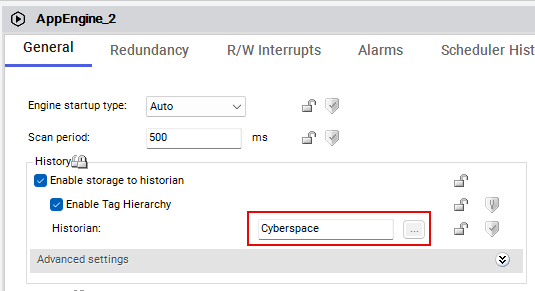Hi everyone,
I’m working on an OCMC setup where the OPC UA connection is successfully established—I can see the device structure and diagnostics, and System Platform is configured correctly. However, real-time data is not updating.
The logs show repeated gRPC errors when trying to connect to the historian at SRPD8929321:32565, with StatusCode="Unavailable" and error = 164 (Communication Error). Despite the OPC UA server showing as connected, the historian fails to communicate.
Any insights on resolving this historian communication issue or validating historian readiness would be greatly appreciated!
Thanks in advance.
Heres the error code:
SRPAOS923404.SRPDB923291: Failed to connect to Historian at SRPDB923291:32565 - error = 164 (Communication Error) - Grpc.Core.RpcException: Status(StatusCode="Unavailable", Detail="Error starting gRPC call. HttpRequestException: An error occurred while sending the request. WebException: Unable to connect to the remote server SocketException: A connection attempt failed because the connected party did not properly respond after a period of time, or established connection failed because connected host has failed to respond 10.233.34.194:32565", DebugException="System.Net.Http.HttpRequestException: An error occurred while sending the request.") ---> System.Net.Http.HttpRequestException: An error occurred while sending the request. ---> System.Net.WebException: Unable to connect to the remote server ---> System.Net.Sockets.SocketException: A connection attempt failed because the connected party did not properly respond after a period of time, or established connection failed because connected host has failed to respond 10.233.34.194:32565
at System.Net.Sockets.Socket.InternalEndConnect(IAsyncResult asyncResult)
at System.Net.Sockets.Socket.EndConnect(IAsyncResult asyncResult)
at System.Net.ServicePoint.ConnectSocketInternal(Boolean connectFailure, Socket s4, Socket s6, Socket& socket, IPAddress& address, ConnectSocketState state, IAsyncResult asyncResult, Exception& exception)
--- End of inner exception stack trace ---
at System.Net.HttpWebRequest.EndGetRequestStream(IAsyncResult asyncResult, TransportContext& context)
at System.Net.Http.HttpClientHandler.GetRequestStreamCallback(IAsyncResult ar)
--- End of inner exception stack trace ---
at System.Runtime.CompilerServices.TaskAwaiter.ThrowForNonSuccess(Task task)
at System.Runtime.CompilerServices.TaskAwaiter.HandleNonSuccessAndDebuggerNotification(Task task)
at Grpc.Net.Client.Web.GrpcWebHandler.<SendAsyncCore>d__18.MoveNext()
--- End of stack trace from previous location where exception was thrown ---
at System.Runtime.CompilerServices.TaskAwaiter.ThrowForNonSuccess(Task task)
at System.Runtime.CompilerServices.TaskAwaiter.HandleNonSuccessAndDebuggerNotification(Task task)
at System.Runtime.CompilerServices.TaskAwaiter.ValidateEnd(Task task)
at Grpc.Net.Client.Internal.GrpcCall`2.<RunCall>d__82.MoveNext()
--- End of inner exception stack trace ---
at System.Runtime.CompilerServices.TaskAwaiter.ThrowForNonSuccess(Task task)
at System.Runtime.CompilerServices.TaskAwaiter.HandleNonSuccessAndDebuggerNotification(Task task)
at Grpc.Net.Client.Internal.HttpClientCallInvoker.BlockingUnaryCall[TRequest,TResponse](Method`2 method, String host, CallOptions options, TRequest request)
at Grpc.Core.Interceptors.InterceptingCallInvoker.<BlockingUnaryCall>b__3_0[TRequest,TResponse](TRequest req, ClientInterceptorContext`2 ctx)
at Archestra.Historian.GrpcClient.ClientInterceptor.BlockingUnaryCall[TRequest,TResponse](TRequest request, ClientInterceptorContext`2 context, BlockingUnaryCallContinuation`2 continuation)
at Grpc.Core.Interceptors.InterceptingCallInvoker.BlockingUnaryCall[TRequest,TResponse](Method`2 method, String host, CallOptions options, TRequest request)
at Grpc.Core.Interceptors.InterceptingCallInvoker.<BlockingUnaryCall>b__3_0[TRequest,TResponse](TRequest req, ClientInterceptorContext`2 ctx)
at Grpc.Core.ClientBase.ClientBaseConfiguration.ClientBaseConfigurationInterceptor.BlockingUnaryCall[TRequest,TResponse](TRequest request, ClientInterceptorContext`2 context, BlockingUnaryCallContinuation`2 continuation)
at Grpc.Core.Interceptors.InterceptingCallInvoker.BlockingUnaryCall[TRequest,TResponse](Method`2 method, String host, CallOptions options, TRequest request)
at ArchestrA.Grpc.Contract.History.HistoryService.HistoryServiceClient.GetInterfaceVersion(GetInterfaceVersionRequest request, CallOptions options)
at ArchestrA.Grpc.Contract.History.HistoryService.HistoryServiceClient.GetInterfaceVersion(GetInterfaceVersionRequest request, Metadata headers, Nullable`1 deadline, CancellationToken cancellationToken)
at Archestra.Historian.GrpcClient.GrpcHistoryClient.GetServerInterfaceVersion(UInt32& interfaceVersion)
at CHistoryConnectionGrpc.GetInterfaceVersion(CHistoryConnectionGrpc* , UInt32* pVersion, SError* error) [CommonBase.cpp, 965]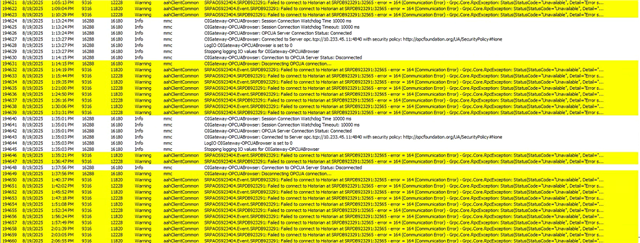
For SetUp Reference:

